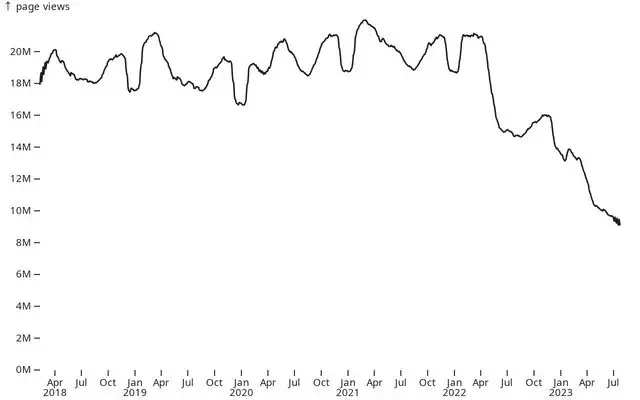- cross-posted to:
- tech@kbin.social
- technews@radiation.party
Over the past one and a half years, Stack Overflow has lost around 50% of its traffic. This decline is similarly reflected in site usage, with approximately a 50% decrease in the number of questions and answers, as well as the number of votes these posts receive.
The charts below show the usage represented by a moving average of 49 days.
What happened?



In my experience many of the answers have become out of date. It’s gradually becoming an archive of the old ways of doing things for many languages / frameworks.
Questions are often closed as a duplicate when the linked question doesn’t apply anymore. It’s full of really bad ways of doing things.
I’m not really sure of the solution at this point.
Also ChatGPT.
It’s a last resort for me nowadays.
Yeah, this is what they get and deserve. They rose by providing meaningful, helpful, and technically adept answers to questions. Then they encouraged an abusive moderator culture that marks questions as duplicate, linking to unrelated questions. They also still do not offer easy ways for the knowledge base to be updated as things over time change. Now the company abusing their abusive moderators, causing them to basically go on strike right now.
Here’s hoping the next thing doesn’t suck as much ass as Stack Exchange ultimately has.
https://en.m.wikipedia.org/wiki/Fediverse
Based on that, there is no “q&a” type of Fediverse software (a clear answer and a clear “voted best” answer).
Stack overflow had a huge number of “mod tools” to help curate the content (gold nuggets) given. They did not do the step of aggregating content (gold ingots) like Wikipedia has. The marking as duplicate could and should be tempered by “due diligence” or “age of the last time this was asked”, but how it is implemented is up to them.
To be fair™ they did at least do a little bit to deal with the existing answers becoming obsolete by changing the default answer sorting. The “new” (it’s already been at least a year IIRC) sorting pushes down older answers and allows newer answers to rise to the top with fewer votes. That still doesn’t fix the issue that the accepted answer likely won’t change as new ways of doing things become standard, but at least it’s a step in the right direction.
One thing I’ve always wondered about stack overflow is why is there only one accepted answer ever possible even though this is programming and there are many different ways of doing any given thing?
Ironic, since one of ChatGPT’s biggest weaknesses is that it’s an archive of the old ways of doing things. You can’t filter by time on ChatGPT, and ChatGPT isn’t being retrained on the latest knowledge live. These aren’t inherent to GPT, so it’s possible that a future iteration will overcome these issues.
On ChatGPT, if a solution doesn’t work, you can ask in real time for a different one. On SO, your post just gets locked for being a duplicate.
Asking in real-time wouldn’t help in this scenario (e.g. some mirror is no longer accessible). If anything, it’d just lead you further astray and waste more time, because GPT’s knowledgebase doesn’t have this knowledge.